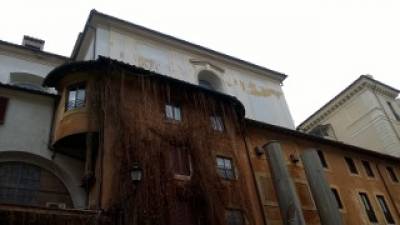
The End of Spectrum is an international and interdisciplinary research network on inequality and social marginality. Currently hosted by the UCL Institute of Archaeology, the network involves archaeologists, historians, anthropologists, research consultants and cultural heritage experts who share an interest in social exclusion in present and past societies, and intend to develop collaborative research and outreach activities on this topic.
Topics
Topics of interest for the network include but are not limited to:
- Dynamics of resistance and the agency of the socially excluded
- Violence and coercive power
- Poverty, inequality, starvation and slavery
- Disease and disability
- Bioarchaeological approaches to social marginality
- Gender, age and personhood; marginality and social exclusion in relation to motherhood, pregnancy and childhood neglect
- Anomalous burial rites, funerary deviancy and marginal burial
- Marginal landscapes and peripheral regions; ethnic marginality
- Marginality in times of crisis, collapse, catastrophe, climate change, environmental instability and accelerated socio-political transformation
- Marginality and inequality in relation to social complexity as a deep time issue
- Material culture and technology between deprivation and élite consumption
- Marginality and social exclusion today; Intangible Cultural Heritage (ICH) and the safeguarding of marginalized people's endangered cultural heritage
Aims
The aims of the network include:
- Contribution to the development of adequate theoretical and methodological frameworks to investigate past marginality, and promote marginality studies in archaeology
- Promotion of collaborative research on social marginality at UCL by creating crucial links between single scholars and projects/networks that are already operating
- Fostering national and international collaborations and outreach activities involving scholars who work in both archaeology and cognate disciplines such as heritage studies, history and anthropology
- Acting as a visible umbrella group for further initiatives by network members
Related outputs
Collaborative initiatives by network members include:
- E. Perego, A. Reynolds and A. Gardner have co-organized the network's first public event, a workshop on past social marginality held at the Institute on 15 June 2016. The workshop - kindly supported by the Institute of Archaeology within the framework of its Academic Initiatives -features talks by network members from Italy, the UK, Austria and Brazil, and is open to attend for UCL staff and students.
- V. Tamorri, E. Perego, R. Scopacasa, and V. Tamorri have recently started a new collaboration on Intangible Cultural Heritage (ICH) and social marginality in archaeology and museum studies. The first results of this collaboration have been presented in a range of publications and conference talks.
- R. Scopacasa and E. Perego have recently started a new collaboration on climate and social change in ancient Italy; one of the aims of the Ancient Italy Climate Project is to investigate the effects of climate change on non-elite and marginal social segments in late prehistoric and early Roman Italy. Opportunities for funding applications and future collaborations are currently being investigated by the project leaders.
Recent publications on network-related themes include:
- Perego, E. and Scopacasa, R. (in press 2016) (eds.) Burial and Social Change in First-millennium BC Italy: Approaching Social Agents. Gender, personhood and marginality. Oxford, Oxbow Books.
- Brookes, S. and Reynolds, A. (in press 2016) Territoriality and social stratification: the relationship between neighbourhood and polity in Anglo-Saxon England. In S. Brookes, J. Escalona and O. Vesteinsson (eds.), Neighbourhood and Polity in Early Medieval Europe. Turnhout, Brepols.
- Reynolds, A. (2015) New directions in medieval landscape archaeology: An Anglo-Saxon perspective. In A. Chavarría Arnau and A. Reynolds (eds.) Detecting and Understanding Historic Landscapes. Mantova, SAP Società Archeologica.
- Gardner, A. (in press 2016) Roman Britain from the outside: Comparing western and northern frontier cultures. In S. González Sánchez and A. Guglielmi (eds.) 'Romans' and 'Barbarians' beyond the Frontiers: Archaeology, Ideology and Identities in the North. Oxford, Oxbow Books (TRAC Research Papers).
Recent invited talks on network-related themes include:
- R. Scopacasa and E. Perego (2016) The Samnite State of Emergency: approaching crisis events and resolution strategies in Republican Italy (400-80BC)
- E. Perego (2015) Ideological constructions of childhood in Bronze and Early Iron Age Italy: Between marginality and social inclusion. Children in Antiquity (University of Sidney).
- V. Tamorri (2015) Methodological approaches to the excavation of subadult burials. Lecture delivered at the Museum of Lugnano (Rome, Italy)
- A. Reynolds (2015) Anglo-Saxon social complexity. Paper delivered at the Department of Archaeology, Oslo University The State of the Samnites. KNIR (Rome, Italy)
Public engagement and outreach activities by network members include:
- A. Reynolds contributed to England's Vampires, broadcasted in the USA on PBS and in the UK on Channel 4.
- E. Perego, V. Tamorri, V. Tamorri, and R. Scoapacasa are contributing to a major Italian event on cultural heritage, RomArchè 2016: Museums' Time, with two written papers and a talk entitled From Intangible Cultural Heritage (ICH) to social marginality in the museum context: Problems and perspectives.
Funding
- Academic Initiatives of the UCL Institute of Archaeology.
- Previous support for research on social marginality includes the 2013-14 Raleigh Radford Rome Fellowship, the British School at Rome, and a 2012-13 Celtic Research Trust Bursary to Elisa Perego, both crucial to develop many of the ideas on which this network is based.
 Close
Close

